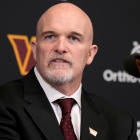At some point this offseason, the Packers are going to sign Aaron Rodgers to a new contract. It could happen imminently, although if you buy into the rumblings, certain things Rodgers wants included in said contract could potentially derail the discussions.
For instance, the Packers quarterback might want a player option beyond the first two or three years of his deal, a virtually unheard-of option for NFL contracts. (Think Carmelo Anthony here; despite having fallen off a cliff physically, he was still able to opt into his deal with the Thunder for almost $28 million next year.)
Or perhaps Rodgers wants to have a fully guaranteed deal like that of Kirk Cousins, who signed this offseason for $84 million with the Vikings.
Maybe Rodgers wants, as he alluded to in a conversation with Peter King of NBC Sports, a percentage-based contract instead. Per King, Rodgers "sounded very much like a unique contract suits him more than a usual one" and Rodgers admitted as much.
"It's only been on my mind because … people have been writing and talking about it a lot," Rodgers said. "There have been many conversations about it. I think that there's some merit to looking into where you do a non-traditional contractual agreement. If anybody at this point is gonna be able to do something like that, I think there needs to be a conversation about it. I never said anything about [tying the contract to] the cap. I just think there's ways to do contracts where you can still be competitive so the team is happy about it, but have some more freedom."
In other words: Rodgers is probably sick of the standard quarterback-contract market. In this market, he signs a deal and then the next quarterback -- pretty much regardless of who it is -- bypasses him within the next two years. Maybe it's Russell Wilson (the most likely candidate) or maybe it's a young quarterback coming off a monster 2018 season (Jared Goff, Jameis Winston, Marcus Mariota, etc.).
But it happens. If Rodgers were to tie his contract to the cap, though, he would see a raise every single year that the cap spiked. There are two problems with this.
One, as Jason La Canfora pointed out to me on the Pick Six Podcast (interview dropping Wednesday, subscribe here to get it in your pod inbox), the percentage of the cap here is going to be a problem.
"You ask me what does that mean? If that [percentage] number starts with a 3, then it's not feasible," La Canfora pointed out. "The way they want to run their business, it would not fly. I think $35 [million] a year is the absolute extreme he could get. I don't think we go from $30-35, but I do believe it will get done, and it will be $32-ish and that becomes the springboard, for [whoever is next]."
Do the math and even just twenty percent of the cap would be almost $35 million per year for Rodgers in 2018 alone. That would be problematic for the Packers, in terms of how they want to construct their roster, even if they fully understand they have no choice but to keep Rodgers on the payroll.
The argument against Green Bay in this regard involves how much money the Packers are pocketing in terms of profit, which was revealed on Monday when the team's financials emerged publicly. Rodgers could, as Mike Florio of Pro Football Talk pointed out, try and demand a percentage of gross revenue from the Packers, which would be extremely fascinating. (Although it's hard to juxtapose a ceiling-less revenue number against a contract involved in a cap space situation).
Perhaps the biggest problem for the Packers and Rodgers in that regard is the coming CBA negotiations. Neither the Packers nor Rodgers -- nor any teams, really -- want to tie themselves to a contract that goes well beyond the current CBA window. We have no clue what the next CBA will look like, but teams and players may want to be careful signing deals that are longer than three years, because of the ramifications they could have once the new CBA kicks in, assuming there isn't a lockout to begin with.
All of this may mean that Rodgers simply decides to deal with a three-year contract that's fully guaranteed and topples what Cousins got from Minnesota, while also pushing him past Matt Ryan of the Falcons on many of the standard valuations for these deals.






















